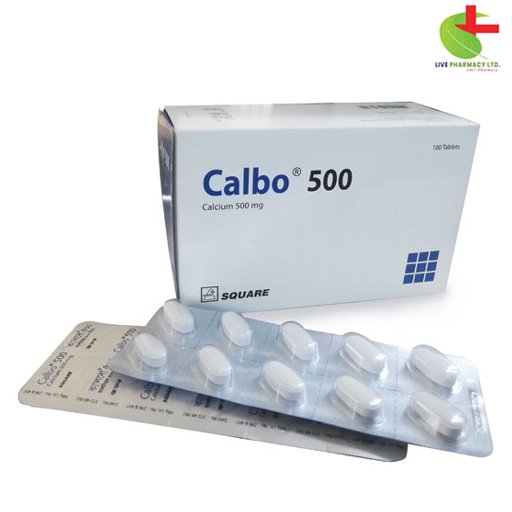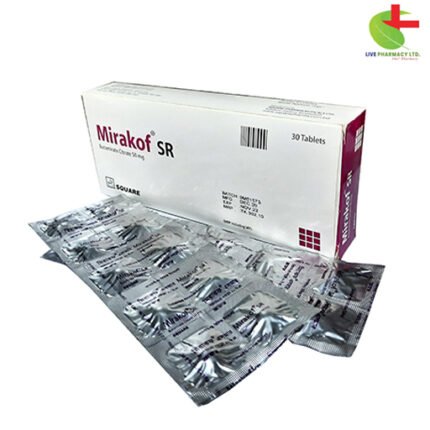Calbo 500
50.00৳ Strip
- Calcium carbonate tablets available in strengths of 250 mg, 500 mg, and 1000 mg.
- Addresses conditions like hypoparathyroidism, chronic diarrhea, and hyperphosphatemia.
- Provides support for bone health and relief from acid indigestion.
- Precise dosages tailored for effective management of calcium-related issues.
- Quality supplements crafted to meet diverse healthcare needs.
 Brand
Brand
|
Square Pharmaceuticals PLC |
|---|---|
 Generics
Generics
|
Calcium [Elemental source] |
Indications
For the treatment or prevention of calcium depletion in patients where dietary measures are insufficient. Conditions associated with calcium deficiency may include hypoparathyroidism, achlorhydria, chronic diarrhea, vitamin D deficiency, steatorrhea, sprue, pregnancy and lactation, menopause, pancreatitis, renal failure, alkalosis, and hyperphosphatemia. Calcium carbonate is increasingly utilized for treating hyperphosphatemia in chronic renal failure, as well as in patients on continuous ambulatory peritoneal dialysis (CAPD) and hemodialysis. Some patients may require additional measures such as stringent dietary phosphate restriction or small doses of aluminum hydroxide for complete phosphate control. While calcium carbonate preparations can provide short-term relief of dyspeptic symptoms, they are no longer recommended for long-term treatment of peptic ulceration.
Pharmacology
Calcium carbonate reacts with gastric acid to form a salt and water. The chemical reaction can be represented as: CaCO3 + 2HCl = CaCl2 + H2O + CO2. Calcium carbonate increases gastric pH, thereby reducing pepsin activity in gastric secretion. Up to 30% of oral calcium load may be absorbed.
Dosage & Administration
For adults, recommended doses of calcium carbonate as an antacid range from 540-2000 mg per day, with children’s doses being half of those for adults. As a dietary supplement for preventing osteoporosis, a daily intake of 1250-3750 mg of calcium carbonate (500-1500 mg calcium) is generally recommended. Dosages may need adjustment based on individual patient needs, specific diseases such as calcium deficiency, malabsorption, or parathyroid function. During pregnancy and lactation, the recommended daily calcium dose is 1200-1500 mg. In chronic renal failure, doses range from 2.5-9.0 grams per day, adjusted according to individual patient requirements. To enhance phosphate binding, calcium carbonate should be taken with meals.
Interactions
Calcium carbonate may potentiate the cardiac effects of digoxin and other cardiac glycosides in cases of systemic hypercalcemia. It may also interfere with the absorption of concomitantly administered tetracycline preparations, requiring modification of vitamin D therapy in chronic renal failure to avoid hypercalcemia.
Contraindications
Avoid use in cases of hypercalcemia, hyperparathyroidism, hypercalciuria, nephrolithiasis, Zollinger-Ellison syndrome, and concomitant digoxin therapy. Discontinue the drug if hypercalcemia occurs. Use calcium salts cautiously in patients with sarcoidosis, renal or cardiac disease, and those receiving cardiac glycosides.
Side Effects
Oral administration of calcium carbonate may irritate the GI tract and cause constipation. Hypercalcemia is rare but may occur with large doses in patients with chronic renal failure.
Pregnancy & Lactation
Calcium carbonate is widely used during pregnancy for oral calcium supplementation or antacid therapy and can be used during lactation.
Use in Special Populations
Extensively studied in children and infants with chronic renal failure, calcium carbonate is considered safe and effective. In elderly patients with renal failure, constipation may be a concern, necessitating monitoring of serum calcium and phosphate levels.
Therapeutic Class
Minerals in bone formation, Specific mineral preparations.
Storage Conditions
Store in a cool, dry place at controlled room temperature.













Reviews
There are no reviews yet.